- Home
- Conn Iggulden
Conqueror (2011) c-5 Page 20
Conqueror (2011) c-5 Read online
Page 20
With long silk banners fluttering on his left and right, the enemy rode up in shining armour that glittered in the sun. Meng Guang gaped at Kublai as he halted close to the group of armed men, disdaining their threat. Kublai knew those around him could lace the air with shafts at the first sign of aggression, but Meng Guang’s guards did not. The slow approach unnerved them all, as if he was invulnerable, so far above them in status that they could not possibly threaten him. Under his glare, many of the soldiers looked down, as if the sun itself burned their eyes.
Kublai saw a withered old man in clean robes standing uncertainly before him with empty eyes. The crowds had fled and the square was utterly silent.
In the stillness, one of the bound Mongols managed to wrench his iron post from the stones beneath it. He roared in triumph, taking hold of it like a weapon and advancing on Meng Guang with clear intent. Kublai raised his hand and the man stopped instantly, his chest rising and falling with strong emotion.
‘I said I would spare Ta-li,’ Kublai said in perfect Mandarin. ‘Why did you not listen to me?’
Meng Guang stared into the distance, his mind settling into a cold lump that could not respond. He had lived long and been prefect of the city for decades. It had been a good life. He heard the voice of the enemy as reeds whispering in the darkness, but he did not respond. They could not make him acknowledge them. He prepared himself for death, taking a deep breath and releasing it slowly, so that his racing heart slowed to a steady beat.
Kublai frowned at the lack of reaction. He saw fear in the prefect’s soldiers and rage in the faces of his own men, but the prefect stood and looked out over the city as if he were the only man there. A breeze blew and Kublai shook his head to break the spell. He had seen the body of Lee Ung hanging from its wrists and he made his decision.
‘I am a noble house.’ Kublai said. ‘My lands in the north were once bound to the Sung territories under one emperor. It will be so again. I claim this city as my own, as my right. My protection, my shadow, stands over you all from this moment. Surrender to me and I will show mercy, as a father to his children.’
Meng Guang said nothing, though he raised his eyes at last and met those of Kublai. Almost like a shiver, he shook his head.
‘Very well,’ Kublai said. ‘I see I will have to disappoint a friend. Take this one and hang his body from the walls. The rest will live.’
He watched closely as the Mongol with the iron pole shouldered through the guards and pushed Meng Guang through to the front. The old man went without a protest and his guards did nothing. They did not dare look at each other, understanding at last that their lives hung on a single word from this strange prince who spoke in the language of authority.
‘My word is iron,’ Kublai said to the guards, as Meng Guang was led away. ‘Your people will come to know this, in time.’
Hulegu was panting slightly as he drew to a halt and passed his hunting eagle to its handler. The bird screeched and flapped, but the man knew her well and calmed the bird with a hand on her neck.
General Kitbuqa carried a white-flecked kestrel on his right arm, but he had only two pigeons on his belt and his expression was sour. Hulegu grinned at him as he dismounted and handed over a small deer, its head lolling brokenly. His cook was Persian, a local man who claimed to have once served the caliph himself. When he had been captured on the way back to the city from some distant market, Hulegu had taken him into his staff. It pleased him to eat meals the caliph should have been enjoying, though he made sure to have them tasted first. The dark-skinned man bobbed his head as he took the flopping animal, his gaze bright on the eagle as she fussed. His people loved to hunt the air. Hawks and kestrels were treasures, but the massive eagles were almost unknown in that region. The dark gold bird that settled on the handler’s wrist was worth a fortune.
Hulegu looked to Baghdad, just two miles to the north. His armies surrounded the ancient walled city, even to the point of blocking the Tigris with pontoons they had constructed in his absence. In all directions, he could see the dark smears of his tumans, waiting patiently. The caliph had refused to destroy the walls as an expression of his good faith. Hulegu still had the letter somewhere in his packs. The words were clear enough, but it was still a mystery to him. The man had written of the followers of Mohammed, certain that they would rise up to defend the centre of their faith. Hulegu wondered where they all were as his army settled in around the city. In a previous generation, the caliph might have been right, but Genghis had slaughtered his way across the region, not once but twice. It amused Hulegu to think of the survivors crawling out of rubble, only to encounter Genghis on his way back to the Xi Xia territory on his last campaign. Baghdad did not have the support it had enjoyed in previous centuries, but the caliph seemed almost unaware of his isolation.
Hulegu accepted a drink of orange juice, chilled in the river overnight. He knocked it back and tossed the cup to a servant without looking to see if the man caught it. The people of Baghdad did not share their master’s confidence in God. Every night, they let themselves down by ropes, risking broken bones by scrambling down the rough walls. Hulegu had no idea how many people there were inside, but each dawn found another hundred or so being herded up by his men. It had become almost a game to them. He let his men practise their archery on the groups, giving the men and boys to be slaughtered while the women and girls were handed out to those who had pleased their officers. The caliph had not surrendered. Until he did, their lives were forfeit.
Hulegu heard the sizzle as his cook put fresh-cut venison steaks into a pan of hot fat. The smell was laced with garlic and his mouth watered in anticipation. The man was a marvel. Kitbuqa’s pitiful pigeons would not add much meat to the general’s noon meal, he thought, but then that was the difference between eagles and hawks. His eagle could send even a wolf tumbling. She and Hulegu were the same, he thought complacently. Predators did not need mercy. He could envy the bird its perfect single-minded ruthlessness. It had no doubts or fears, nothing to trouble a mind dedicated only to the kill.
Once more, he looked to Baghdad and his mouth tightened to a thin line. His cannons barely chipped the stones. The city’s defensive walls had been designed with sloping surfaces that sent the balls skipping away with little damage. When the black powder was gone, he would be left with torsion catapults and heavy trebuchets. In time, they would still break the walls, but not with the same roaring terror, not with the same feeling of godlike power. Baghdad was known to have no boulders for miles around it, but his men had planned for that, collecting them in carts as they came south. Eventually, they would run out and he would have to send his tumans to collect more.
Hulegu grimaced to himself, weary of the same thoughts spinning in his head as each slow day passed. He could assault the walls at any time, but they were still strong. Stubborn defenders could take as many as four or five of his men for each one they lost. That was the purpose of castles and walled cities, after all. They would pour naphtha oil and drop rocks on those trying to climb. It would be a bloody business and he did not want to see thousands of his men killed over one city, no matter how much wealth was reputed to lie inside its walls. It would always be better to smash the walls down, or for starvation to bring the caliph to his senses.
‘If you make me wait much longer,’ Hulegu muttered, staring at the distant city, ‘it will go hard with you.’
General Kitbuqa looked up as he spoke and Hulegu realised the man was still hoping for an invitation to share the noon meal. He smiled, recalling the eagle’s stoop. There was too much meat for one man, but he did not offer to share it. Hawks and eagles did not fly together, he reminded himself. They were very different breeds.
Caliph al-Mustasim was a worried man. His ancestors had secured a small empire around Baghdad that had lasted five centuries, with the city as the jewel. It had even survived the ravages of Genghis as he swept through the area decades before. Al-Mustasim liked to believe Allah had made the Mongol khan blind to the c
ity, so that he rode past it without stopping. Perhaps it was even true. Al-Mustasim was not only of the royal Abbasid line, but also the leader of the Moslem faith in the world, his city a light for them all. Surely there were armies on their way to relieve Baghdad? He clasped his hands and felt the sweat on them as his fingers slid together and apart, over and over. The caliph was large of body, his flesh made soft by years of luxury. He felt the clammy perspiration in his armpits and clicked his fingers to have slave girls approach and wipe him with cloths. He did not break off his fearful thoughts as they tended to him, raising his arms and wiping at the smooth brown expanse that was revealed beneath his silks and layers. They had been chosen for their beauty, but he had no eyes for them that day. He barely noticed as one of them fed him sticky sweets from a bowl, pressing them into his mouth as if they fattened a prize bull.
As he lay there, a cluster of laughing children ran into the room and he looked fondly at them. They brought noise and life, enough to pierce the despair that weighed him down.
‘The qamara!’ his son demanded, looking up at him beseechingly. The other children waited in hope to see the marvel and al-Mustasim’s face softened.
‘Very well, just for a little while before you return to your studies,’ he said.
He waved his arm and they scattered before it, whooping in excitement. The device had been built to the specifications of the great Moslem scientist, Ibn al-Haitham. ‘Qamara’ was merely the word for ‘dark room’, but the name had stuck. Only a few servants went with him as he walked along a corridor to the room where it had been constructed. The children ran ahead in their excitement, telling those who had not already seen it everything they could remember.
It was a room in itself, a large structure of black cloth that was as dark as night inside. Al-Mustasim gazed on the black cube fondly, as proud as if he had invented it himself.
‘Which one of you will be first?’ he asked.
They leapt and shouted their names and he picked one of his daughters, a little girl named Suri. She stood shivering with delight as he placed her in the right spot. As the curtain fell, plunging them all into darkness, the children shouted nervously. His servants brought a flame and soon little Suri was lit brightly by shuttered lamps. She preened in the attention and he chuckled to see her.
‘The rest of you go through that partition now. Close your eyes and do not open them until I say.’
They obeyed him, feeling their way through the layer of black cloth by touch.
‘Are you all ready?’ he asked.
The light from the lamps on Suri would pass through a tiny hole in the cloth. He did not fully understand how light could carry her inverted image, but there she would be, inside the room with them in light and shadow. It was a marvel and he smiled as he told them to open their eyes.
He heard them gasp in wonder calling to each other to see.
Before al-Mustasim could organise another to take Suri’s place, he heard the voice of his vizier Ahriman speaking to the servants outside. Al-Mustasim frowned, the moment of simple joy spoiled. The man would not leave him in peace. Al-Mustasim sighed as Ahriman cleared his throat outside the qamara, summoning his attention.
‘I am sorry to disturb you, caliph. I have news you must hear.’
Al-Mustasim left the children to their games, already growing raucous in the dark tent. He blinked as he came back into the sunlit rooms and took a moment to send a couple of his servants inside to make sure the boys did not break anything.
‘Well? Has anything changed since yesterday, or the day before? Are we still surrounded by infidels, by armies?’
‘We are, caliph. At dawn, they sent another flight of arrows over the walls.’
He held one in his hand with the scroll still tight around it. He had already unwrapped another and held it out to be read. Al-Mustasim waved it away as if its touch would corrupt him.
‘Another demand to surrender, I am certain. How many of these have I seen now? He threatens and promises, offers peace and then annihilation. It changes nothing, Ahriman.’
‘In this message he says he will accept tribute, caliph. We cannot continue to ignore him. This Hulegu is already famous for his greed. In every town that he destroys, his men are there, asking: “Where is the gold? Where are the jewels?” He does not care that Baghdad is a sacred city, only that it has treasure rooms filled with metals.’
‘You would have me give the wealth of my line to him?’
‘Or see the city burn? Yes, caliph, I would. He will not leave. He has the scent of blood in his nostrils and the people are afraid. There are rumours everywhere that the Arabs are already dealing with him, telling him about the secret ways into the city.’
‘There are no secret ways,’ al-Mustasim snapped. His voice was high and sounded petulant, even to his own ears. ‘I would know if there were.’
‘Nonetheless, it is what they discuss in the markets. They expect Mongol warriors to come creeping into Baghdad every night we delay. This man wants only gold, they say. Why does the caliph not give the wealth of the world to him, that we may live?’
‘I am waiting, Ahriman. Have I no allies? No friends? Where are they now?’
The vizier shook his head. ‘They remember Genghis, caliph. They will not come to save Baghdad.’
‘I cannot surrender. I am the light of Islam! The libraries alone … My life is not worth a single text. The Mongols will destroy them all if they set foot in my city.’
He felt anger grow at the frown on Ahriman’s face and stepped further away from the qamara so that the children would not hear their discussion. It was infuriating. Ahriman was meant to support his caliph, to plan and defeat his enemies. Yet the vizier could suggest nothing but throwing gold at the wolves.
Ahriman watched his master in frustration. They had known each other for a long time and he understood the man’s fears. They were justified, but it was not a choice between survival and destruction. It was a choice between surrendering and keeping some dignity, or risking the wrath of the most destructive race Ahriman had ever known. There were too many examples in their history to ignore.
‘The Shah of Khwarezm resisted them to the end,’ Ahriman said softly. ‘He was a man among men, a warrior. Where is he now? His cities are black stones, his people are broken: slaves or the dead. You told me always to speak the truth to you. Will you hear it now when I tell you to open the gates and save as many as you can? Each day we make him wait in the heat, his anger grows.’
‘Someone will come to relieve the city. We will show them then,’ Al-Mustasim said plaintively. He did not even believe it himself and Ahriman merely snorted in derision.
Al-Mustasim rose from his couch and walked to the window. He could smell the scented soaps in the market, blocks by the thousand made in workshops in the western quarter. It was a city of towers, of science and wonders, and yet it was threatened by lengths of sharp iron and black powder, by men who would not even understand the things they saw as they smashed them apart. Beyond the walls, he could see the Mongol armies, shifting like black insects. Al-Mustasim could barely speak for grief and tears filled his eyes. He thought of the children, so blissfully unaware of the threat all around them. Despair pressed him down.
‘I will wait another month. If no one comes to aid my home, I will go out to my enemies.’ His throat was thick, choking him as he spoke. ‘I will go out to them and negotiate our surrender.’
CHAPTER NINETEEN
Hulegu watched the gates creak open, pushed by teams of men under the lash. He was sweating already, aware of the sun on his skin even as it grew in intensity. Naturally dark, he had never known sunburn before the endless weeks of siege around Baghdad. Now the first kiss of warmth each day felt like a branding iron held to his flesh. His own sweat stung him, dribbling over his eyebrows and lashes to irritate his eyes and make him blink. He had done his best to keep the tumans fit and alert, but the sheer boredom of a siege was like one of the rashes that spread slowly across the fle
sh of otherwise healthy men. He scratched his groin at the thought, feeling the cysts there. It was dangerous to allow his shaman to cut them, as infection often followed, but in the privacy of his own ger, Hulegu squeezed the worst of them each night, reducing the hard lumps each time until pain made him stop. The oily white substance remained on his fingers. He could smell its pungency even as he stood there and waited for the caliph.
At least it would soon be over. There had been two attempts to escape his grip around the city, both of them along the river. The first had been in small boats constructed inside the iron river gates. They had been destroyed with naphtha oil, the helpless men in them drenched as clay jugs were thrown from the banks, then set alight with flaming arrows. Hulegu did not know who had died that day. There had been no way to identify the bodies afterwards, even if he had been interested.
The second attempt had been more subtle, just six men with their bodies blackened in soot and oil. They had reached the pontoons his men had built across the Tigris, anchored to heavy trunks jammed into the soft riverbed. The sharp eyes of one of his scouts had seen them sliding through the water and his warriors had unlimbered their bows, taking care with each shot as they laughed and called targets to each other. It may have been the last blow to the caliph’s hopes; Hulegu did not know. He had received word that al-Mustasim would meet him outside the city the following day.
Hulegu frowned as he watched a long retinue stride out of the city. He had demanded surrender once again, but the caliph had not even answered, preferring to wait for the meeting between them. Hulegu counted as the small column lengthened. Two hundred, three, perhaps four. At last it came to an end and the gates closed behind them, leaving the caliph’s soldiers to march their master into Hulegu’s presence.

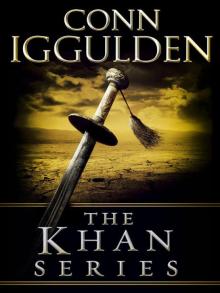 The Khan Series 5-Book Bundle
The Khan Series 5-Book Bundle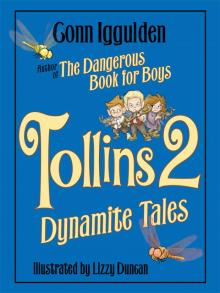 Tollins 2: Dynamite Tales
Tollins 2: Dynamite Tales Tollins: Explosive Tales for Children
Tollins: Explosive Tales for Children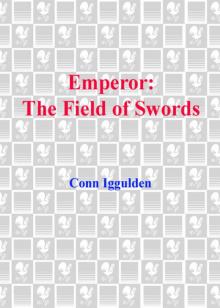 The Field of Swords
The Field of Swords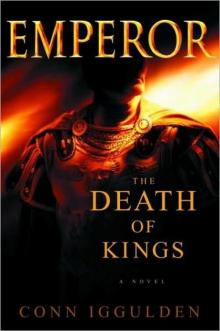 The Death of Kings
The Death of Kings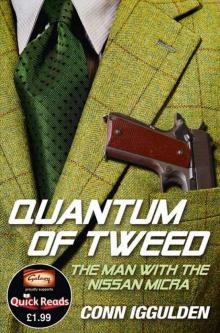 Quantum of Tweed: The Man With the Nissan Micra
Quantum of Tweed: The Man With the Nissan Micra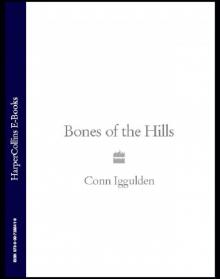 Bones of the Hills
Bones of the Hills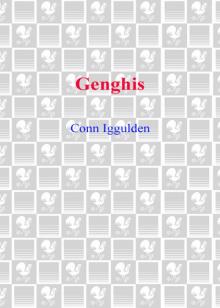 Genghis: Birth of an Empire
Genghis: Birth of an Empire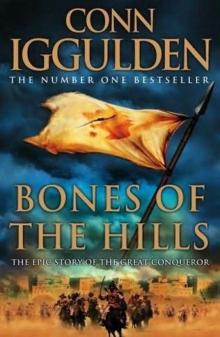 The Gates of Rome
The Gates of Rome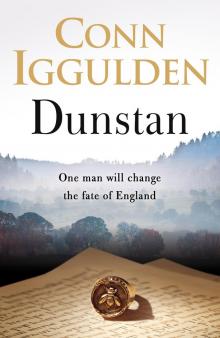 Dunstan
Dunstan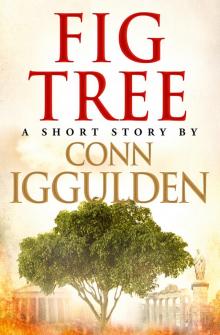 Fig Tree
Fig Tree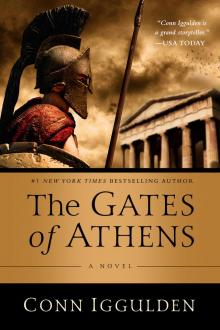 The Gates of Athens
The Gates of Athens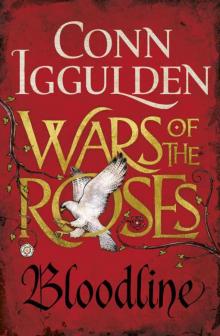 Stormbird
Stormbird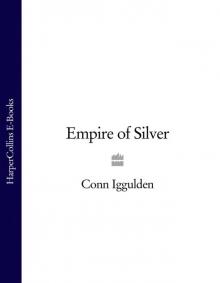 Khan: Empire of Silver
Khan: Empire of Silver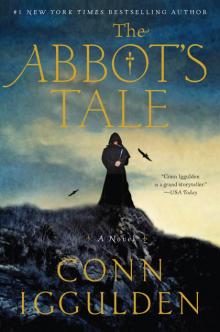 The Abbot's Tale
The Abbot's Tale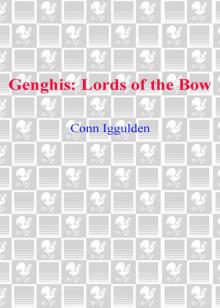 Gengis: Lords of the Bow
Gengis: Lords of the Bow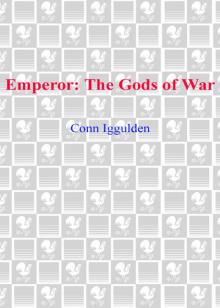 The Gods of War
The Gods of War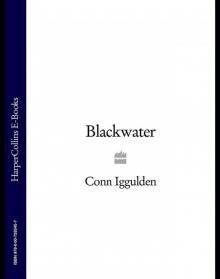 Blackwater
Blackwater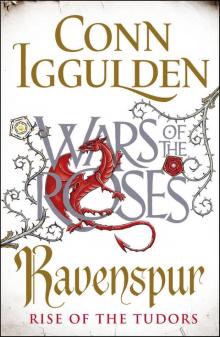 Ravenspur: Rise of the Tudors
Ravenspur: Rise of the Tudors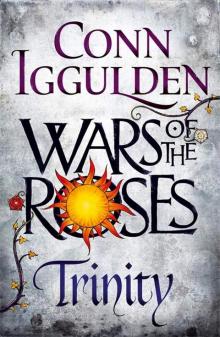 Wars of the Roses: Trinity (War of the Roses Book 2)
Wars of the Roses: Trinity (War of the Roses Book 2)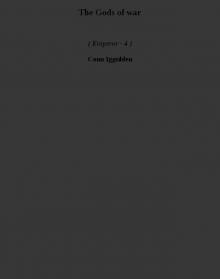 The Gods of war e-4
The Gods of war e-4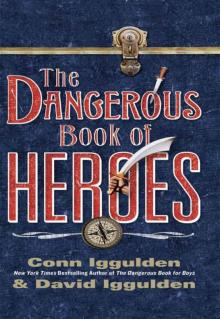 The Dangerous Book of Heroes
The Dangerous Book of Heroes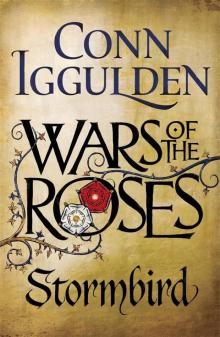 Stormbird wotr-1
Stormbird wotr-1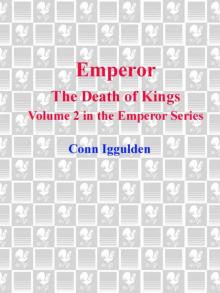 Emperor: The Death of Kings
Emperor: The Death of Kings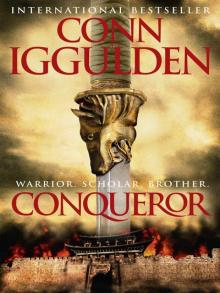 Conqueror (2011) c-5
Conqueror (2011) c-5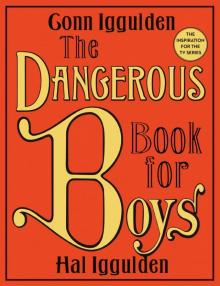 The Dangerous Book for Boys
The Dangerous Book for Boys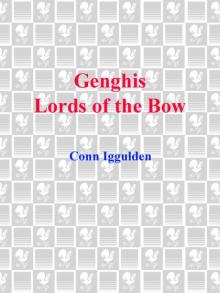 Genghis Lords of the Bow
Genghis Lords of the Bow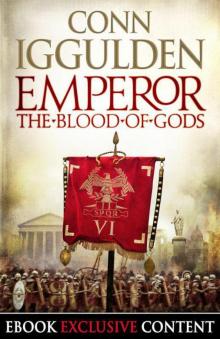 Emperor: The Blood of Gods (Special Edition) (Emperor Series, Book 5)
Emperor: The Blood of Gods (Special Edition) (Emperor Series, Book 5)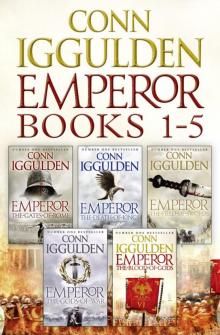 The Emperor Series: Books 1-5
The Emperor Series: Books 1-5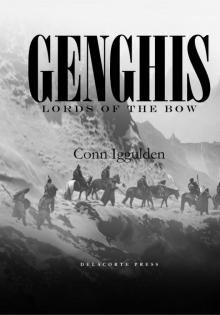 Lords of the Bow c-2
Lords of the Bow c-2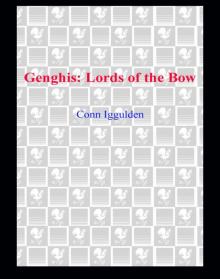 Lords of the Bow
Lords of the Bow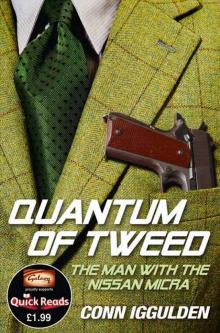 Quantum of Tweed
Quantum of Tweed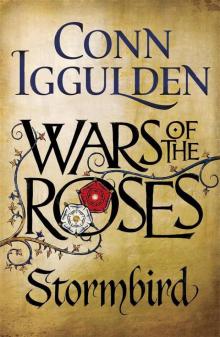 Wars of the Roses 01 - Stormbird
Wars of the Roses 01 - Stormbird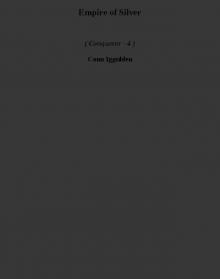 Empire of Silver c-4
Empire of Silver c-4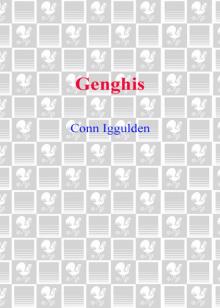 Birth of an Empire
Birth of an Empire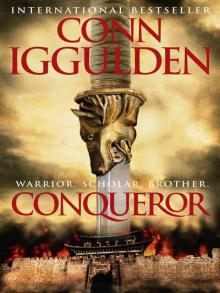 Conqueror (2011)
Conqueror (2011)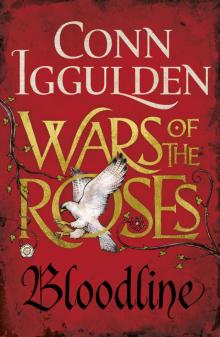 Wars of the Roses: Bloodline: Book 3 (The Wars of the Roses)
Wars of the Roses: Bloodline: Book 3 (The Wars of the Roses)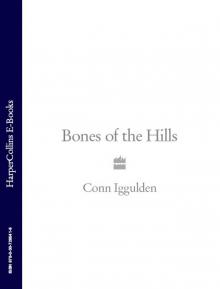 Bones Of the Hills c-3
Bones Of the Hills c-3 Empire of Silver
Empire of Silver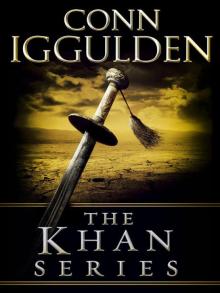 The Khan Series 5-Book Bundle: Genghis: Birth of an Empire, Genghis: Bones of the Hills, Genghis: Lords of the Bow, Khan: Empire of Silver, Conqueror
The Khan Series 5-Book Bundle: Genghis: Birth of an Empire, Genghis: Bones of the Hills, Genghis: Lords of the Bow, Khan: Empire of Silver, Conqueror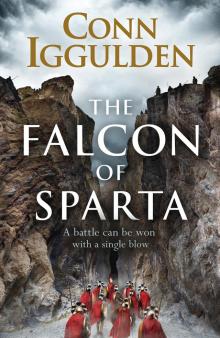 The Falcon of Sparta
The Falcon of Sparta Explosive Tales for Children
Explosive Tales for Children